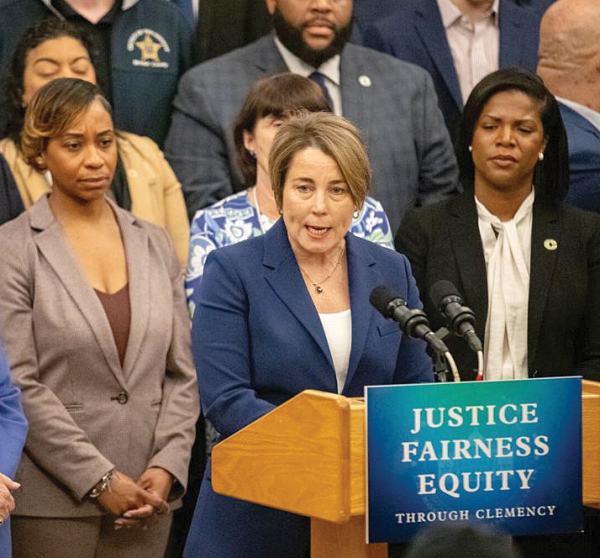March 20, 2024

Gov. Maura Healey announced details of her proposed blanket pardon for simple cannabis possession at a Grand Staircase press conference last week joined by Attorney General Andrea Campbell, left, and Cannabis Control Commission Acting Chair Ava Callender Concepcion, right.
Sam Drysdale/SHNS photo
Gov. Healey’s plan to pardon all misdemeanor marijuana possession convictions will impact hundreds of thousands of people, she told a crowd at the Grand Staircase on March 13 and represents “the most sweeping cannabis pardon ever proposed by any governor in the United States.”
The governor had not yet filed the actual pardon recommendation with the Governor’s Council, but she said it will “pardon all misdemeanor convictions for marijuana possession on record in our state.” Final approval power rests with the elected council, which under its rules cannot vote on the matter until at least seven days after it receives Healey’s request.
Healey said her move makes Massachusetts “the first state to take action” since President Joseph Biden in 2022 asked the nation’s governors to follow his lead on pardoning simple cannabis possession convictions.
An old conviction for cannabis possession can form “a barrier to jobs, getting housing, even getting an education,” Healey said.
“For some, it’s also simply more than that, a difficult memory, a burden, something they live with every day,” she added. “All for doing something that isn’t even cause for arrest today. That doesn’t sit right with me, it’s not fair, it’s unfinished business. Knowing we have the power to lift that burden, we should do something about it.”
The governor said her administration worked with the Trial Court and the Probation Service in forming the blanket pardon, and credited deputy legal counsel Adam Hornstine with taking on a significant role. Multiple Governor’s Council members also told the News Service last Tuesday that the administration, including legal counsel Paige Scott Reed, solicited their input in advance.
Two council members stood on the steps with Healey for Wednesday’s big announcement — Councilors Paul DePalo and Marilyn Petitto Devaney, who told the News Service she was “over the moon.”
“People will remember her. She’ll have a legacy, this governor, for doing this. I just think it’s a wonderful, compassionate thing that she did,” said Devaney, of Watertown.
Pardon recipients will have an option to request a certificate of pardon, though that will not be necessary, the governor said. Healey did not provide reporters a clear answer of how long it could take for criminal records to reflect the change, both saying it would be “automatic” and saying, “it’s just a matter of taking time to go through and update the records.”
“Remember, people will not need to do anything. You will be pardoned. And you will have that cleared from your record,” she added. As for the number of people wrapped up in the blanket pardon, the governor referred to “hundreds of thousands” and said the approximate figure was “extrapolated” from data. “Not a specific number, but the number’s huge,” Healey said.
“We know there were 68,800 between 2000-2013 but records could be going back decades further,” press secretary Karissa Hand said.
“Black people have carried the enormous burden of a biased criminal legal system for decades,” said Attorney General Andrea Campbell, who joined Healey at the press conference. She referenced how “a disproportionate number of those who have been arrested and convicted for marijuana possession are Black and Brown people.”
The Massachusetts mega-pardon “will inspire other states to follow,” Campbell added.
The state’s former top prosecutor, Healey opposed cannabis legalization in 2016 along with Republican Gov. Charlie Baker. On Wednesday, she referred to herself as “willing to evolve.”
“The reason we do this is simple – justice requires it,” she said.


